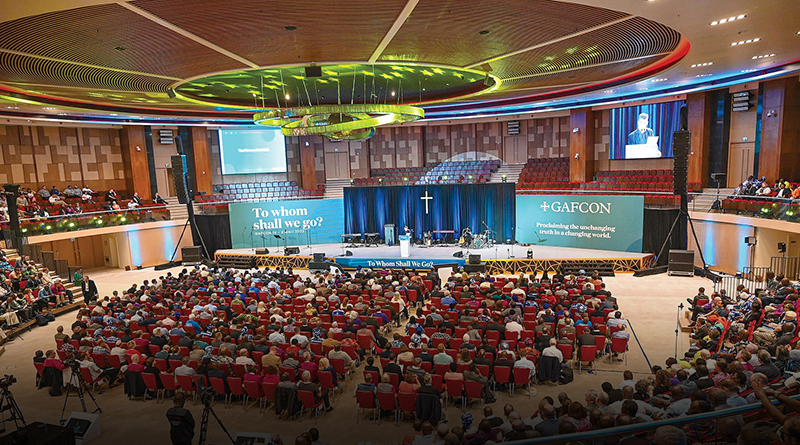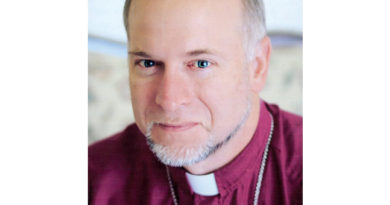Rwanda: Global gathering rejects Anglican Communion’s governing structures
By Sue Careless
AN INTERNATIONAL conference of Anglican leaders, deeply troubled by the Church of England’s blessing of same-sex unions, have rejected the four governing structures that currently hold the Anglican Communion together – including the Archbishop of Canterbury.
Lambeth Palace has responded by restating that Anglican structures can be altered – but only by the structures themselves.
The conference held in Kigali, the Rwandan capital, was convened under the auspices of the Global Fellowship of Confessing Anglicans, or GAFCON, a group formed in 2008 that advocates orthodoxy in the Anglican Communion. They were joined by leaders of the Global South Fellowship of Anglican Churches (GSFA), which holds a similar doctrinal position.
Over 1300 delegates from 52 countries met April 17-21, including 315 bishops, 456 other clergy and 531 laity. The Primates present represented the overwhelming majority (estimated at 85 percent) of worshipping Anglicans worldwide.
The meeting comes two months after the Church of England synod welcomed a proposal to offer prayers of blessing to same-sex couples.
On Apr. 21 the conference issued the Kigali Commitment which repudiated the four “Instruments of Unity” of the Anglican Communion, saying that they had “failed to maintain true communion based on the Word of God and shared faith in Christ.”
The communiqué continued: “We have no confidence that the Archbishop of Canterbury nor the other Instruments of Communion led by him (the Lambeth Conference, the Anglican Consultative Council and the Primates’ Meetings) are able to provide a godly way forward that will be acceptable to those who are committed to the truthfulness, clarity, sufficiency and authority of scripture.”
The communiqué made it clear that the dividing issue is homosexual practise, about which it cited “repeated departures from the authority of God’s Word.” It said: “The latest of these departures is the majority vote by the General Synod of the Church of England in February 2023 to welcome proposals by the bishops to enable same-sex couples to receive God’s blessing.
“It grieves the Holy Spirit and us that the leadership of the Church of England is determined to bless sin. Since the Lord does not bless same-sex unions, it is pastorally deceptive and blasphemous to craft prayers that invoke blessing in the name of the Father, Son and Holy Spirit.”
The communiqué continued: “We reject the claim that two contradictory positions can both be valid in matters affecting salvation. We cannot ‘walk together’ in good disagreement with those who have deliberately chosen to walk away from the ‘faith once for all delivered to the saints’ (Jude 3).”
The communiqué, which was read to the participants by the Primate of the Church of Nigeria, the Most Rev’d Henry Ndukuba, added that “successive Archbishops of Canterbury have failed to guard the faith by inviting bishops to Lambeth who have embraced or promoted practices contrary to Scripture.”
Although not named, the reference is to the current Archbishop of Canterbury Justin Welby and his predecessor, Rowan Williams, who was archbishop from 2002-2012.
“This failure of church discipline has been compounded by the current Archbishop of Canterbury who has himself welcomed the provision of liturgical resources to bless these practices contrary to scripture. This renders his leadership role in the Anglican Communion entirely indefensible.”
The chair of the GAFCON statement committee, the Bishop of South Sydney, Dr Michael Stead, said: “It is clear from this conference that most of the world’s Anglicans have lost confidence in the Archbishop of Canterbury to provide a godly way forward that will be acceptable to those who are committed to the truthfulness, clarity, sufficiency and authority of scripture. This grieves us, but it is they who have walked away from us.”
The Kigali Commitment stated that “both GSFA and GAFCON Primates share the view that . . . they can no longer recognise the Archbishop of Canterbury as an Instrument of Communion, the ‘first among equals’ of the Primates. The Church of England has chosen to impair her relationship with the orthodox provinces in the Communion.”
The communiqué contained the proviso, which quotes Lambeth I:10: “We oppose the vilification or demeaning of any person including those who do not follow God’s ways, since all human beings are created in God’s image.”
Yet the communiqué did not formally condemn or even mention Uganda’s anti-homosexual bill. When it was first proposed in March, the legislation outraged human rights defenders and would seem to be a clear violation of this aspect of Lambeth I:10. Members of the public were going to have to report individuals in same-sex relationships to the authorities. Abp Foley Beach, who chaired the GAFCON conference, did say in an interview with Kirk Peterson of The Living Church Magazine that he would not “personally endorse it.” Uganda’s parliament has since watered down the bill that originally criminalised people for simply identifying as LGBTQ+.
The Kigali Commitment continued: “The Bible is God’s Word written, breathed out by God as it was written by his faithful messengers (2 Timothy 3.16). It carries God’s own authority, is its own interpreter, and it does not need to be supplemented, nor can it ever be overturned by human wisdom…. [it] is the final authority in the church.
“This fellowship is broken when we turn aside from God’s Word or attempt to reinterpret it in any way that overturns the plain reading of the text in its canonical context and so deny its truthfulness, clarity, sufficiency, and thereby its authority (Jerusalem Declaration #2).”
The Church of England’s decision in February to bless same-sex couples was, as it were, the last straw. The orthodox leaders’ concerns go back a quarter-century:
“Despite 25 years of persistent warnings by most Anglican Primates, repeated departures from the authority of God’s Word have torn the fabric of the Communion. These warnings were blatantly and deliberately disregarded and now without repentance this tear cannot be mended.”
The 1998 Lambeth conference, the last one at which all the provinces of the Communion were in attendance, passed resolution I.10 which declares that “homosexual practice is incompatible with Scripture,” and advised against the “legitimising or blessing of same-sex unions.”
At the most recent Lambeth conference in the summer of 2022, Abp Welby affirmed that “the validity of the resolution passed at the Lambeth Conference 1998, I.10 is not in doubt and that whole resolution is still in existence.”
In their communiqué the GAFCON and GSFA leaders did not divorce doctrine from pastoral care but saw the two as intricately linked:
“Aware of our own sin and frailty, we commit ourselves to providing appropriate pastoral care to all people in our churches. This is all the more necessary in the current context of sexual and gender confusion, made worse by its deliberate and systematic promotion across the world.
“Appropriate pastoral care affirms faithfulness in marriage and abstinence in singleness. It is not appropriate pastoral care to mislead people, by pretending that God blesses sexually active relationships between two people of the same sex. This is unloving as it leads them into error and places a stumbling block in the way of their inheriting the kingdom of God (1 Corinthians 6:9-11).”
Despite references to the necessity of “resetting the Communion,” few details were given in the communiqué about what the next steps towards this might be. They did, however, announce “the establishment of a foundation endowment” and said later that “a significant number of donors have made pledges.” The communiqué also encouraged the GAFCON provinces to “become financially self-sufficient, not only to advance mission but also to avoid being vulnerable to economic manipulation.”
The Kigali Commitment reflects a closer alignment of the two major organizations of theologically conservative Anglicans. While they had always agreed on doctrine, their tactics have differed.
The GAFCON primates of Nigeria, Rwanda and Uganda have boycotted major Anglican Communion events since 2008, including Lambeth 2008 and Lambeth 2022.
GAFCON held its first conference in Jerusalem in 2008, and from there issued its founding document The Jerusalem Declaration. Then every five years Anglican lay, clergy and bishop delegates from over 40 countries have met together at GAFCON conferences. This was the fourth.
Since its creation, GAFCON has developed parallel jurisdictions in areas where it believes the established Anglican province has departed from the Christian faith. For example, in Canada GAFCON supports the Anglican Network in Canada (ANiC).
Fifteen Canadians attended the conference. Thirteen were lay and clergy delegates from ANiC, including its leader, Bishop Dan Gifford and three other bishops.
Two bishops from the Anglican Church of Canada also attended as observers: David Parsons, diocesan bishop of the Arctic, and Joey Royal, suffragan bishop of the Arctic.
In the past, the GSFA has attempted to work within the structures of the Communion, and was well-represented at Lambeth 2022. The GFSA, however, signaled a change in an Ash Wednesday statement on Feb. 22 that foreshadowed the Kigali Commitment: “The GSFA is no longer able to recognize the present Archbishop of Canterbury, the Rt. Hon. & Most Revd. Justin Welby, as the ‘first among equals’ leader of the global Communion.”
Abp Foley Beach, who chaired the GAFCON conference and who is the leader of the Anglican Church in North America, of which ANiC is a founding member, said at the opening ceremony:
“Sadly, and with broken hearts, we must say that until the Archbishop of Canterbury repents, we can no longer recognize him as the first among equals, spiritually. It’s time for the whole Anglican establishment to be reformed anyway. I mean, why does a secular government of only one of the nations represented in the Anglican Communion still get to pick the spiritual leader of the Anglican Communion? This makes no sense in today’s post-colonial world.”
At a press conference after the release of the Kigali Commitment, reporters asked if the conservatives intended to establish a rival “first among equals.” Abp Beach said that was among the many details yet to be worked out. “I do believe there’s going to be some kind of move to elect somebody to be chair of a global Primates Council of some sort, which will not include Canterbury.”
Beach’s term as chair of the Global Primates Council of GAFCON concluded at the end of the Kigali conference. Abp Laurent Mbanda of the Anglican Church of Rwanda has been elected as the next council chair.
While GAFCON and GSFA together enjoy the overwhelming numerical superiority of worshipping Anglicans, the See of Canterbury has far greater financial resources, bureaucratic infrastructure, and history. Welby is the 105th Archbishop of Canterbury, in a line of succession dating back fourteen centuries to Augustine of Canterbury in A.D. 597.
The Lambeth Palace response
In a response to the Kigali communiqué, a Lambeth Palace spokesperson said that Abp Welby agreed that Anglican structures “are always able to change with the times — and have done so in the past,” but that “no changes to the formal structures of the Anglican Communion can be made unless they are agreed upon by the Instruments of Communion.”
This had been stated at the recent Anglican Consultative Council meeting held in Accra, Ghana, in mid-February. It was attended by Primates, bishops, clergy, and laity from 39 of the 42 Anglican provinces, where “there was widespread support for working together patiently and constructively to review the Instruments of Communion, so that our differences and disagreements can be held together in unity and fellowship.” TAP
The full text of the GAFCON communique can be read here: https://www.churchtimes.co.uk/articles/2023/28-april/news/world/the-gafcon-kigali-communiqu%C3%A9-in-full
With files from Kirk Petersen of The Living Church Magazine who attended the conference in Kigali.




